- Home
- Stephen R. Donaldson
The Gap Into Vision: Forbidden Knowledge Page 2
The Gap Into Vision: Forbidden Knowledge Read online
Page 2
Unfortunately “motherfucker” was a word Milos particularly disliked. Helpless to stop himself, he flushed. He tried to conceal his reaction behind another nic, but he knew Angus had seen him. He couldn’t control the tremor in his hands.
The damage to Angus’ features made him look maniacal. Glaring at Milos, he said, “I’ll talk, all right. As soon as you file your murder charge, I’ll talk. I’ll talk to everybody.”
Milos stared back at Angus. Angus was the only one sweating, but Milos felt that he himself was the only one afraid.
“I’ll tell them,” Angus said, “there’s a traitor in Security.” He said the words as if he could prove them whenever he wanted. “I’ll even tell them who it is. I’ll tell them how I know. I’ll tell them how to be sure I’m telling the truth. As soon as you file your charge.
“I’ll trade his name for immunity. Or maybe”—Angus was sneering—“I’ll try for a pardon.”
Tensing against the distress in his bowels, Milos asked, “Who is it?”
Angus’ glare didn’t waver. “When you file your charge.”
Milos did the best he could to face down the danger. “You’re bluffing.”
“You’re bluffing,” Angus retorted. “You aren’t going to file that charge. You don’t want to find out what I know. You never have.” Then he concluded happily, “Motherfucker.”
Milos bit down on his nic. Because he was fastidious, he felt no desire to assault his prisoner physically. He didn’t want the sensations of Angus’ sweat and pain on his hands. Instead he keyed a command that brought the guards back. When they arrived, he instructed them to take Angus away. Then, abruptly, he became calm.
The trembling was gone from his fingers as he dumped the actual recording from the computer and substituted his dummy. After that he stubbed out his nic, thinking, Filthy habit. I’m going to quit. Remembering that he’d made similar commitments in the past, he added, I mean it. Really.
At the same time, in a part of his mind which had suddenly become a separate compartment, like a computer file that couldn’t be accessed without a secret command, he was thinking, Shit. Shitshit. Shitshitshit.
He appeared quite normal and perfectly correct as he went down to Communications to make two or three tight-beam transmissions which weren’t recorded, couldn’t be traced, and might have been impossible to decipher if they were intercepted. Then he returned to his office and continued working.
The recording of his session with Angus attracted no particular attention, and deserved none.
Angus resumed his yellow-eyed and irreducible silence.
On Com-Mine Station, nothing changed.
Milos Taverner might as well have been safe.
Nevertheless when the order came through to have Angus Thermopyle frozen, Milos heaved a sigh of entirely private and malicious relief.
CHAPTER 1
Morn Hyland didn’t open her mouth from the moment when Nick Succorso grabbed her arm and steered her through the chaos in Mallorys to the time when he and his people brought her to the docks where his frigate, Captain’s Fancy, was berthed. His grip was hard, so hard it made her forearm numb and her fingers tingle, and the trip was a form of flight; frightened, almost desperate. She was running with all her courage away from Angus even though Nick never moved faster than a brisk walk. Nevertheless she clung to the zone implant control in her pocket, kept both fists buried in the pockets of her shipsuit to mask the fact that she was concealing something, and let Nick’s grasp guide her.
The passages and corridors were strangely empty. Security had cleared them in case Angus’ arrest turned into a fight. The boots of Nick’s crew struck echoes off the decking: the knot of men and women protecting Morn from Station intervention moved as if they were followed by a suggestion of thunder, metallic and ominous; as if Angus and the crowd in Mallorys were after her. Her heart strained against her lungs, filling her with pressure. If anybody stopped her now, she would have no defense against a charge which carried the death penalty. But she fixed her gaze straight ahead of her, kept her mouth shut, clenched her fists in her pockets; let Nick’s people sweep her along.
Then they reached the docks. Beyond the clutter of tracks and cables between the gantries lay Nick’s ship. She missed her footing on a power line and couldn’t use her hands to catch herself; but Nick hauled her up again, kept her going. Here the danger of being stopped was gravest. Station Security was everywhere, guarding the docks as well as the cargo inspectors, dock-engine drivers, stevedores, and crane operators. If Nick’s deal with Security fell apart—
But nobody made any move to stop her, or the people protecting her. The station-side lock stood open; Captain’s Fancy remained shut until one of Nick’s crew keyed it.
Nick took Morn inside, nearly drove her through the airlocks with the force of his grip.
After the expanse of the docks, she had the sensation that she was entering a small space—almost that she was being cornered. The frigate’s lighting seemed dim and cloying compared to the arc lamps outside. She’d done everything she could think of to get away from Angus: she’d committed herself to this when she accepted the zone implant control. But now she caught her first glimpse of the place she was escaping to, the constricted passages of an unknown ship, and she nearly balked.
Captain’s Fancy was a trap: she recognized that. For a moment the knowledge that she was going aboard another ship, another ship, where there was little hope and certainly no help, came close to seizing her muscles, paralyzing her like a spasm.
Then all Nick’s people were aboard; and she had no time for paralysis. The airlock cycled closed. Nick Succorso took hold of her by the shoulders: he was about to put his arms around her. This was what he’d rescued her for—to possess her. The first crisis of her new life was upon her, when she was so full of alarm that she wanted to strike at him, drive his touch away.
Nevertheless she had the presence of mind to stop him by saying, “No heavy g.”
Morally more than physically, Morn Hyland was exhausted to the core of her bones. Under the circumstances, perhaps the best that could be said about her was that she was half insane from rape and gap-sickness, from horror and panic and Angus’ manipulation of her zone implant. During her weeks with him, she’d done and experienced things which would have sent her into caterwauling nightmares if she’d had the strength to dream. And then, despite everything, she’d saved his life. To all appearances, she’d been conquered by the desperate vulnerability which made the victims of terrorists fall in love with them.
Appearances were deceptive, however. She hadn’t fallen in love: she’d made a deal. The price was that she was here, aboard Nick’s ship, at his mercy. The recompense was that she had the control to her zone implant in her pocket.
Saving Angus may have been the only cold-bloodedly crazy act of her relatively young life.
But if she’d lost her mind, she was still only half insane. No one who was totally mad could have come through that ordeal with the presence of mind to protest to Nick Succorso, “Please. No heavy g. Not without warning me.”
She may have been cornered, but she wasn’t beaten.
Her gambit succeeded. He stopped, stared at her oddly. She could see that he was suspicious. He wanted her. He also wanted to know what was going on. And he needed to get his ship away from Com-Mine.
“What’s the matter?” he demanded. “You sick or something?”
“I’m too weak. He—” She managed a shrug as eloquent as Angus’ name. “I need time to recover.”
Then she forced her mind blank, as she’d done so often with Angus, so that her visceral abhorrence of any male contact wouldn’t make her do anything foolish—like kneeing Nick in the groin when he embraced her.
He was accustomed to women who dropped dead with pleasure when he took them. He wouldn’t have been amused by the truth of how she felt about him.
He also wouldn’t have been amused by the real reason she dreaded heavy g.
Th
at was the key to her gap-sickness, the trigger which made her truly and helplessly insane. It had caused her to wreck Starmaster, to attempt a total self-destruct, even though Starmaster’s captain was her father and much of the crew was family; even though Starmaster was a UMCP destroyer which had just watched Angus Thermopyle slaughter an entire mining camp.
Gap-sickness was the sole justification of any kind for the zone implant Angus had placed in her brain—or for the zone implant control she now held. And that control was her only secret; her only defense when she went aboard Captain’s Fancy. She would have tried to kill anybody who took it away from her.
To deflect his suspicions, she was prepared to tell Nick as much about Starmaster as he wished, even though the ship was entirely classified and Morn herself was a cop. As a last resort, she would tell him how Starmaster died. But she would never tell him that Angus had given her a zone implant—and then let her have the control.
Never.
She was a cop: that was the problem. She was a cop—and “unauthorized use” of a zone implant was the single worst crime she could commit, short of treason. The fact that she was helping Angus Thermopyle by hiding the control to her own zone implant only made matters worse. She’d dedicated her life to fighting men like him and Nick Succorso, to fighting evils like piracy and the unauthorized use of zone implants.
But she knew what the control could do for her. Angus had taught her that, inadvertently but well. It had become more important than her oath as a UMC cop, more precious than her honor. She would never give it up.
Rather than betray the truth about herself, she did her best to go blank so that she wouldn’t react as if Nick were Angus when he kissed her.
Fortunately her ploy worked. He had more immediate exigencies to consider. And, after all, the idea that Angus had left her sick and damaged was plausible. Nick released her suddenly and wheeled away.
Over his shoulder, he told his second, “Assign her a cabin. Get her food. Cat if she wants it. God knows what that bastard did to her.”
As Nick strode away, Morn heard him say, “We’re leaving. Now.” He had hunger in his voice and a livid flush in the scars under his eyes. “Security doesn’t want us to hang around. That’s part of the deal.”
Morn knew what his hunger meant. But now she would have a little time to get ready for it.
Inside her shipsuit she was sweating so fearfully that she reeked of it.
Nick’s second, a woman named Mikka Vasaczk, was in a hurry. Maybe she was eager to get to the bridge herself. Or maybe she knew she was being supplanted and didn’t like it. Whatever the reason, she was brusque and quick.
That suited Morn.
Riding the soft pressure of hydraulics, they took the lift down—“down” would become “up” as soon as Captain’s Fancy undocked and engaged her own internal-g spin—to the cabin deck which wrapped around the ship’s holds, engines, data banks, and scan- and armament-drivers. Captain’s Fancy was luxurious by any standards, and she had more than one cabin for passengers. Mikka Vasaczk guided Morn to the nearest of these, ushered her inside, showed her how to code the lock and key the intercom. Then the second demanded, not quite politely, “You want anything?”
Morn wanted so many things that her desire left her weak. With an effort, she replied, “I’m all right. I just need sleep. And safety.”
Mikka had assertive hips; she moved like she knew how to use them in a variety of ways. The way she cocked
“Don’t count on it.” She grunted sardonically. “None of us is safe while you’re aboard.
“You’d better be careful. Nick has better sense than you think.”
Without waiting for a reply, she left. The door swept shut behind her automatically.
Morn felt like weeping. She felt like curling herself into a ball and cowering in the corner. But she had no time for tears and cowardice. Her bare survival was in doubt. If she couldn’t find a way to defend herself now, she would never get another chance.
First she tapped a code into the keypad of the lock, not because that would keep people out—the ship’s computer could override her instructions whenever Nick wished—but because it would slow them down; it would warn her when somebody was about to enter.
Then she took out the control to her zone implant.
That small black box was her doom. It showed how much Angus had cost her, how deep the damage he’d done her ran. Her ruin was so profound that she was willing to turn her back on her father and the UMCP and every ideal she’d held worthy—and turn her back, too, on rescue by Com-Mine Security, which would have led to every form of help and comfort the UMCP had at its command, as well as to Angus’ execution—for the sake of control over her own zone implant.
But she also knew the control was her last hope. That was true no matter where she went: it was only more obvious aboard Captain’s Fancy, not more true. With the zone implant, Angus Thermopyle had made her less than she could bear to be. He’d taught her that her physical and moral being were despicable; mere things to be used or abused with impunity, and then discarded if they failed to satisfy him; ill-made objects with no claim on respect. By the same logic, however, the zone implant was the only means by which she could become more than she was. It was her only way past her smallness, past the contemptibility of her own resources. It was power—and she’d been powerless too long. Without it she would never recover from the harm she’d suffered. Nothing else could counteract the lessons Angus had taught her.
Therefore she was dependent on it—and therefore she had to avoid any kind of external help. Com-Mine Station and the UMCP would have done everything they could think of for her; but they would have taken the control away. In effect they would have abandoned her to her unworth.
Once she’d said to Angus, Give me the control. I need it to heal. But he’d refused her then, and now her needs were altogether more compelling.
At the moment, however, they were simply more immediate.
If Nick knew—or guessed—that she had a zone implant, how long would she be able to keep the control itself secret? More than anything, she needed energy. Energy to force down her fear; energy to face him. Energy to distract him.
The zone implant could give her that. It could suppress her brain’s necessary ability to acknowledge fatigue. Unfortunately she only knew what the implant could do: she didn’t know how to use it. Of course, she could read the labels imprinted above the buttons; but she didn’t know how to tune them, how to combine them to produce specialized effects. She could only make her implant function at its crudest.
That had to change. She would be fatally vulnerable until she gained complete mastery over the control, over herself; until she could play her own nerves and synapses the way Angus Thermopyle had played them.
To learn that kind of mastery she needed time. A lot of time.
Right now, the best she could hope for was a few hours.
None of us is safe while you’re aboard. She ignored that. You’d better be careful. Nick has better sense than you think. She dismissed everything except her immediate problem. Her cabin had a private san cubicle and head—and one of the cabinets beside the head held a guest supply of toiletries and personal items; even a small mending kit for torn shipsuits. She took tweezers and used them to open the cover of her zone implant control. Then, with a needle from the kit, she scraped a gap in a tiny section of the control’s circuitry—the section which enabled the control to render her helpless by blocking the link between her brain and body. Angus had used that function often: it allowed him to do what he wanted to her flesh while her mind could only watch and wail.
As well as she could, she made sure that nobody would ever again have the power to simply turn her off. Her electronics training in the Academy was good for that, anyway.
Her fingers were trembling by the time she was done, and she was terrified that she’d made a mistake. But she couldn’t afford to be terrified. None of us is safe while you’re aboard. She also couldn’
t afford mistakes. Nick wanted her. But to her “wanting” meant Angus; it meant brutality and rape. Nick has better sense than you think. Fighting the shakes, she closed the control cover. Deliberately circumspect, she returned the evidence of what she’d done—the tweezers and needle—to the san. Then she sat down on the berth with her back braced against the bulkhead, raised the control, and touched a button.
At once a wonderful lassitude washed through her. Her body seemed to fill up with rest as though she had a syringe of cat plugged into her veins. Drowsiness spread balm along her limbs, soothed ravaged nerve endings, denatured old and essential anxieties. She relaxed slowly down the bulkhead; her head nodded over her chest.
Healing. Safety. Peace.
She was nearly asleep before the desperation she’d learned from Angus came to her rescue.
That sting of panic gave her the strength to turn off the control.
When reality flooded back into her muscles and neurons, sheer visceral disappointment brought tears to her eyes.
But she already knew that living with a zone implant wasn’t easy. She didn’t expect it to be easy: she expected to be in command of it.
She had a nagging sense that she was asking too much of herself, that no human being could do what she intended and get away with it; that the law against “unauthorized use” was absolutely reasonable. In order to make the zone implant serve her effectively, she needed something akin to prescience—a kind of crystal ball. The control included a timer, and that would help. But suppose she decided to risk the rest her body craved. How could she know how long it was safe to sleep? Suppose she turned on energy by suppressing fatigue in an attempt to get through heavy g without going mad. How could she know how much was necessary, or how long her flesh could stand the strain? For that matter, how could she know which centers of her brain were involved in her gap-sickness, which parts of herself she should stifle in order to avoid that state of lunatic calm when the universe spoke to her and told her what to destroy?

 The Illearth War
The Illearth War Last Chronicles of Thomas Covenant 02 - Fatal Revenant
Last Chronicles of Thomas Covenant 02 - Fatal Revenant Lord Foul's Bane
Lord Foul's Bane The Gap Into Ruin: This Day All Gods Die
The Gap Into Ruin: This Day All Gods Die White Gold Wielder
White Gold Wielder Fatal Revenant
Fatal Revenant The Mirror of Her Dreams
The Mirror of Her Dreams Against All Things Ending
Against All Things Ending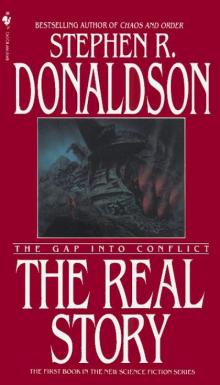 The Real Story: The Gap Into Conflict
The Real Story: The Gap Into Conflict The Power That Preserves
The Power That Preserves Seventh Decimate
Seventh Decimate The Gap Into Power: A Dark and Hungry God Arises
The Gap Into Power: A Dark and Hungry God Arises A Man Rides Through
A Man Rides Through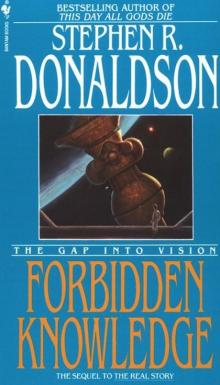 The Gap Into Vision: Forbidden Knowledge
The Gap Into Vision: Forbidden Knowledge The King's Justice: Two Novellas
The King's Justice: Two Novellas The Wounded Land
The Wounded Land The Runes of the Earth
The Runes of the Earth Mordant's Need
Mordant's Need The One Tree
The One Tree Gilden-Fire
Gilden-Fire Reave the Just and Other Tales
Reave the Just and Other Tales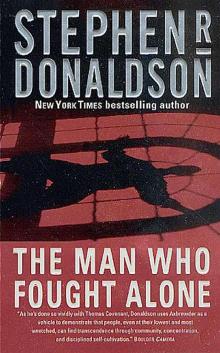 The Man Who Fought Alone
The Man Who Fought Alone The Last Dark
The Last Dark The Man Who Tried to Get Away
The Man Who Tried to Get Away Thomas Covenant 02: The Illearth War
Thomas Covenant 02: The Illearth War A Dark and Hungry God Arises
A Dark and Hungry God Arises The One Tree t2cotc-2
The One Tree t2cotc-2 Lord Foul's Bane cotc-1
Lord Foul's Bane cotc-1 The Illearth War t1cotc-2
The Illearth War t1cotc-2 The Runes of the Earth: The Last Chronicles of Thomas Covenant - Book One
The Runes of the Earth: The Last Chronicles of Thomas Covenant - Book One The King's Justice
The King's Justice White Gold Wielder t2cotc-3
White Gold Wielder t2cotc-3 The Power That Preserves t1cotc-3
The Power That Preserves t1cotc-3 Thomas Covenant 01: Lord Foul's Bane
Thomas Covenant 01: Lord Foul's Bane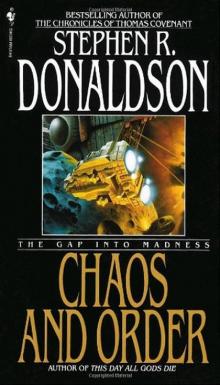 Chaos and Order: The Gap Into Madness
Chaos and Order: The Gap Into Madness Daughter of Regals
Daughter of Regals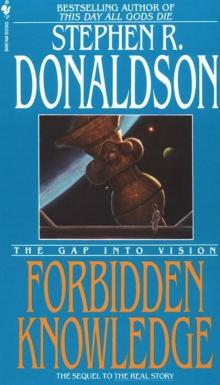 Forbidden Knowledge: The Gap Into Vision
Forbidden Knowledge: The Gap Into Vision Fatal Revenant t3cotc-2
Fatal Revenant t3cotc-2 The Runes of the Earth t3cotc-1
The Runes of the Earth t3cotc-1 Thomas Covenant 03: Power That Preserves
Thomas Covenant 03: Power That Preserves This Day all Gods Die: The Gap into Ruin
This Day all Gods Die: The Gap into Ruin The Wounded Land t2cotc-1
The Wounded Land t2cotc-1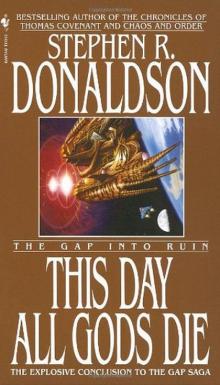 This Day All Gods Die
This Day All Gods Die One Tree
One Tree